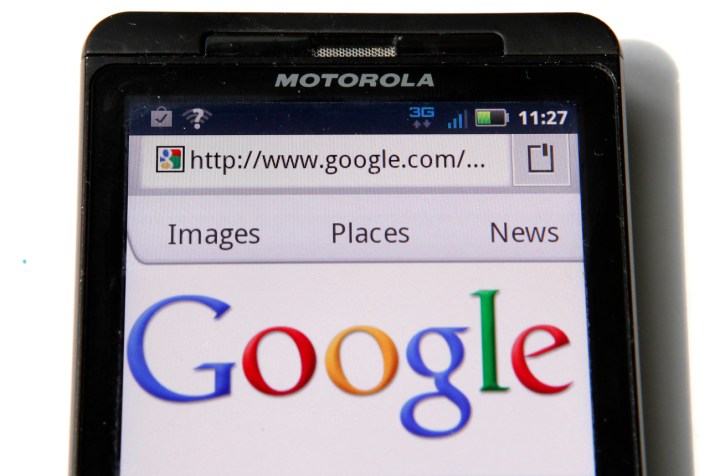Business Maverick, Media, Sci-Tech
Google buys $12.5bn in patents (oh, and Motorola)

Google on Monday announced the transmutation of around a third of its enormous pile of cash into a doomsday weapon to use in the fierce patent battle raging between Apple, Microsoft and Google's Android in the smartphone market. It also happened to buy the entire Motorola consumer business, the part that makes all its cellphones, tablets and set-top boxes. Not that anybody cares about such minor details. By PHILLIP DE WET.
Google has been sniffing around companies in the mobile phone business for a while, but the announcement on Monday of its $40 per share acquisition of Motorola Mobility still came as something of a surprise. Not least of all, we imagine, for Apple, which in the process suffered a setback in its strenuous efforts to lawyer the Android operating system out of existence. Microsoft, too, has reason to be worried, though Oracle has less.
The transaction still requires the blessing of competition authorities in various countries (something Google expects to go smoothly, describing the deal as “pro-competitive”), but otherwise faces few hurdles. Motorola Mobility shareholders sure won’t be complaining. The purchase price, which comes in hard cash, is more than 60% above the levels Motorola Mobility has been trading at in recent months, and even 10% above the all time record-high achieved in January. The boards of both companies unanimously agreed on the terms. Activist shareholder Carl Icahn, who was effectively responsible for splitting the consumer division from the operator-equipment focussed Motorola Solutions early this year and has generally been a pain about unlocking value ever since, is more than happy with the around $500 million he’s earning.
So by the end of this year, or by early 2012, Google should be the outright owner of the once-proud Motorola stable of cellphones, which brought us the first-ever clamshell phone, the StarTac, in 1996, the smash-hit, super-thin Razr in 2004, and precious little of note since. It will own the Android-based Xoom tablet, a competitor to the iPad that Motorola Mobility launched with great fanfare in January, to subsequent poor sales blamed on the bugginess and unintuitive interface of the Android 3.0 Honeycomb operating system. It will own the set-top box business, which earns Motorola Mobility 27% of its revenues by selling Americans decoders for their cable TV services.
And nobody cares, because the acquisition has very little to do with handsets. That’s just incidental in what is, in reality, the purchase of a giant horde of patents.
Google makes Android available free of charge to any handset manufacturer who would like to use it, and it has been enthusiastically adopted by Motorola and Samsung, and to some extent by LG, HTC and others. Thanks to a badly broken US patent system, Apple believes it owns the idea of multi-touch, the use of multiple fingers to input commands on a touch screen, and it has been using claims of patent infringement to delay the launch of some Android devices in some markets. While it may not be able to hold back the Android advance, Apple can either defend the dominance of its iPhone or extract licence fees from manufacturers with such claims. Microsoft, which has its own smartphone operating system, is already claiming such royalties from some manufacturers, based on its own often-dubious patents. Database company Oracle is also claiming patent infringement in parts of Android, Nokia (which uses the Microsoft system exclusively) has some patents it can bring to bear, and several smaller players could also wade in.
All of that combines into a significant threat to the economic viability of Android. Each of those parties can (and in some cases already do) claim licensing fees of between $5 and $10 for every Android phone sold, unless handset manufacturers fancy spending hundreds of millions in legal fees – and still risk losing in the end. That could quickly add up to more than the $25 to $35 we suspect Microsoft charges for Windows Phone – and the Microsoft system comes without any nasty surprises from new claimants down the line.
Ignoring the ultimately useless approach of railing against a system that taxes innovation by allowing overly-broad patents to be enforced, there are only two defences against such claims: pay up, or threaten a variation on mutually assured destruction.
Hence the feeding frenzy when the 6,000 patents that were held by the bankrupt Nortel Networks were put up for auction in April. Those patents, which could be very useful in suing, counter-suing or forcing a truce, eventually fetched $4.5 billion from a consortium in which Apple has a 60% stake. Apple isn’t going to learn any stunning secrets from those patents, and won’t suddenly be able to add enhancements to the iPhone. It paid three times the anticipated price to buy its attack lawyers the equivalent of bullets.
Google was also involved in the Nortel auction. It bid $900 million early on, and then apparently lost interest eschewing round numbers for mathematical in-jokes, such as bidding $3.14159 billion, the approximate value of pi. Which raised an obvious question: why the hell was the company with the most to lose playing with whimsical numbers? We now know the answer: it had a better deal in the works.
Motorola Mobility has more than 17,000 patents in the bank, CEO Sanjay Jha told an investor teleconference on Monday, plus 7,500 pending applications. It’s hard to judge comparative value, but in this game sheer numbers are almost as important. Apple and its partners paid an average of around $750,000 per patent. Google paid $735,000 a piece and also got a full pipeline of future patents, $3.2 billion odd in cash and equivalents, and a business doing more than $3 billion in revenues at a gross margin of just under 26%. All in all, not a bad day at the office.
The majority of analysts on Monday sought insight into how those new patents will be wielded, and there are several options. Will Google seek bilateral truces? Will it form patent pools with friendly handset manufacturers? Will it try for licensing fees higher than those its competitors can charge? Will it offer bounties to anyone who can match a Motorola patent to an iPhone function? Google wasn’t talking, though, saying only that it will continue to build a patent portfolio.
It may need those extra patents to ward off Oracle. Microsoft, Apple, Nokia and others who make or support smarthphones could be very vulnerable in the face of the new Google arsenal. Oracle, though, doesn’t make mobile phones, and Motorola’s patents are unlikely to impact its core business.
Back at the ranch, its supposed to be business as usual. Google promises that Motorola Mobility will continue to operate as a separate entity, with a certain amount of autonomy and separately reported financials. That allows it to continue playing nice with other handset manufacturers, which will now be competitors as well as partners. It also gives Google the option of disposing of the company once the war has been won. Who wants to be in the tawdry hardware business, after all, when every manufacturer pays you allegiance? DM
Read more:
- Motorola second quarter financials (PDF)
- Xoom sales weak at EWeek.
Photo: A Google homepage is displayed on a Motorola Droid phone in Washington August 15, 2011. Google Inc will buy phone hardware maker Motorola Mobility Holdings Inc for $12.5 billion to bolster adoption of its Android mobile software, and compete with smartphone rival Apple Inc. In its biggest deal to date, Google said it would pay $40 per share in cash, a 63 percent premium to Motorola Mobility’s Friday closing price on the New York Stock Exchange. REUTERS/Kevin Lamarque.



















 Become an Insider
Become an Insider